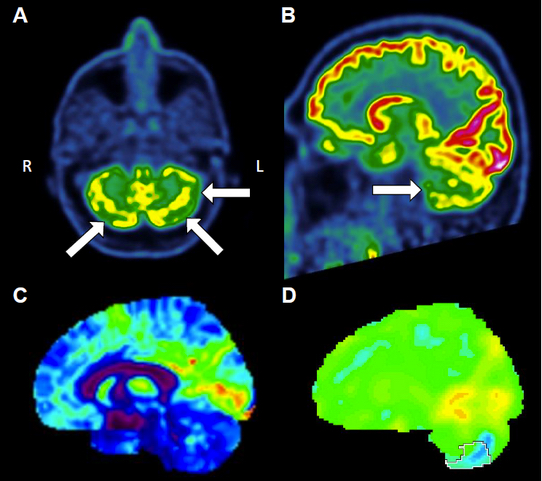Category: Cognitive Disorders (non-PD)
Objective: To describe a novel case of Covid-19-related cognitive affective syndrome with cerebellar hypometabolism and associated neuropathy.
Background: Several Covid-19-related neurological diseases have been described, including strokes, encephalitis and auto-immune disorders such as Guillain-Barré and Miller Fisher syndromes [1,2]. Acute cerebellitis has also been reported [3].
Method: We describe a novel case of cerebellar cognitive affective syndrome (CCAS) [4] linked to cerebellar hypometabolism, and associated demyelinating neuropathy, secondary to Covid-19 infection. The patient was a 48-year-old man, who had Covid-19 infection 20 days before the onset of neurological symptoms, including gait instability, ataxia, hypermetric saccades, nystagmus, dysarthria and areflexia.
Results: 18F-FDG PET revealed significant bilateral cerebellar hypometabolism without cerebral involvement ([Figure 1]; A : axial view, B : sagittal view, white arrows showing hypometabolism areas, C and D : statistical comparison-map with age-matched controls showing hypometabolism in both cerebellar hemispheres). Electrophysiological profile was in favor of acute motor inflammatory demyelinating neuropathy despite no motor weakness was found. Brain MRI was normal. Cerebrospinal fluid (CSF) examination was unremarkable, and CSF SARS-Cov-2 serology was negative. Antiganglioside antibodies were negative. Neuropsychological assessment revealed a dysexecutive syndrome (impaired flexibility, attention, inhibition), and social cognition impairment (TOM-15 cognitive theory of mind test : 13/15) that hindered his activities of daily living [5]. These cognitive impairments were consistent with definite CCAS (CCAS scale, total score : 85/120, failed items : 3/10) [6].
Intravenous immunoglobulins (0,4g/kg/day for 5 days) and rehabilitation started on admission day quickly improved ataxia, but not CCAS. The patient was discharged at home and had ongoing day hospital rehabilitation.
Conclusion: Covid-19 may cause post-infectious cerebellar hypometabolism without MRI lesion, suggesting neuronal dysfunction in the absence of visible structural damage. Demyelinating neuropathy can be associated and worsen gait and balance. Normal MRI should lead to PET imaging to assess cerebellar impairment and neuropsychological screening may help detecting CCAS in these patients, in order to provide appropriate rehabilitation and improve their outcome.
References: 1. Mao L, Jin H, Wang M, et al. Neurologic manifestations of hospitalized patients with coronavirus disease 2019 in Wuhan, China. JAMA Neurol [Internet] 2020 (https://jamanetwork.com/journals/jamaneurology/fullarticle/2764549). 2. Gutiérrez-Ortiz C, Méndez A, Rodrigo-Rey S, et al. Miller Fisher Syndrome and polyneuritis cranialis in COVID-19. Neurology 2020;:10.1212/WNL.0000000000009619. doi:10.1212/WNL.0000000000009619 3. Fadakar N, Ghaemmaghami S, Masoompour SM, et al., A First Case of Acute Cerebellitis Associated with Coronavirus Disease (COVID-19) : a Case Report and Literature Review. Cerebellum 2020; 19(6): 911-914. 4. Schmahmann JD, Sherman JC. The cerebellar cognitive affective syndrome. Brain 1998;121(4):561-79. 5. Desgranges B, Laisney M, Bon L, et al. TOM-15: une épreuve de fausses croyances pour évaluer la théorie de l’esprit cognitive. Rev Neuropsychol 2012;4. 6. Hoche F, Guell X, Vangel MG, et al. The cerebellar cognitive affective/Schmahmann syndrome scale. Brain 2018;141(1):248–70.
To cite this abstract in AMA style:
S. Potel, M. Merceur, P. Méneret, S. Butet, P. Guillemot, G. Silvestre-Beccarel, I. Bonan, F. Le Jeune, M. Vérin. Cognitive-affective syndrome related to cerebellar hypometabolism secondary to Covid-19 infection : a case report [abstract]. Mov Disord. 2021; 36 (suppl 1). https://www.mdsabstracts.org/abstract/cognitive-affective-syndrome-related-to-cerebellar-hypometabolism-secondary-to-covid-19-infection-a-case-report/. Accessed April 20, 2025.« Back to MDS Virtual Congress 2021
MDS Abstracts - https://www.mdsabstracts.org/abstract/cognitive-affective-syndrome-related-to-cerebellar-hypometabolism-secondary-to-covid-19-infection-a-case-report/

